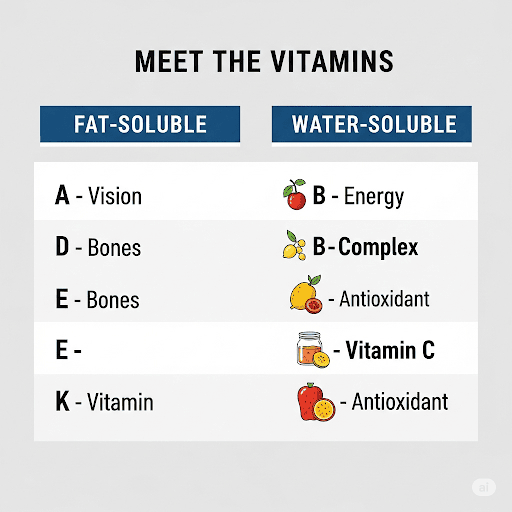When we evaluate our pet's food, we tend to focus on the "big three": protein, fat, and carbohydrates. But beyond these macronutrients lies a cast of unseen heroes working tirelessly behind the scenes. These are the vitamins—micronutrients that, in tiny amounts, orchestrate thousands of critical bodily functions that are essential for life.
The vitamin list on a pet food label can look like a complex chemical equation, often leaving loving pet owners confused. What do all these names mean? Is my pet getting enough? This guide will demystify the world of vitamins in pet food, revealing the vital roles these microscopic powerhouses play in your pet's overall health and well-being.
Fat-Soluble vs. Water-Soluble: Two Teams with Different Jobs
Vitamins are organic compounds that are essential for normal growth and nutrition. They are broadly divided into two teams based on how they are absorbed and stored in the body. Understanding this distinction is key to understanding their role and potential risks.
Fat-Soluble Vitamins (A, D, E, and K)
As the name suggests, these vitamins require fat for absorption and are stored in the body's fatty tissues and liver. Because they are stored, they do not need to be replenished every single day, but it also means they can accumulate to toxic levels if they are over-supplemented.
- Vitamin A: Crucial for healthy vision, skin, immune function, and growth.
- Vitamin D: Regulates calcium and phosphorus levels, making it essential for strong bones.
- Vitamin E: A powerful antioxidant that protects cells from oxidative damage.
- Vitamin K: The "clotting vitamin," essential for normal blood coagulation.
Water-Soluble Vitamins (The B-Complex and Vitamin C)
This group dissolves in water and is not stored in the body. Any excess is simply flushed out through the urine. This means they are very safe, but they must be consumed regularly.
- B Vitamins: This family (including thiamine, riboflavin, niacin, B6, and B12) acts as the spark plugs for the body, helping to convert food into usable energy and supporting nervous system function.
- Vitamin C: Another important antioxidant. While dogs and cats can produce their own Vitamin C, it's often included in food to help support the immune system and preserve freshness.
This concept of fat-soluble vs. water-soluble vitamins is the foundation of modern pet nutrition.
Why You Shouldn't Supplement a Balanced Diet
In our desire to do the best for our pets, it can be tempting to add a multivitamin "just in case." However, this is one area where more is not better. Any commercially prepared diet that is labeled "complete and balanced" according to AAFCO (The Association of American Feed Control Officials) standards is already formulated with all the essential vitamins for dogs and vitamins for cats in the correct amounts.
Adding extra supplements on top of a balanced diet can easily lead to over-dosing, especially the fat-soluble vitamins. An excess of Vitamin D, for instance, can cause severe kidney damage.
The fear of deficiency might tempt you to add supplements, but this can do more harm than good. A precision-based tool like our pet meal planner ensures every recipe is already fortified with the optimal AAFCO-recommended levels of vitamins. It removes the risk of dangerous guesswork and guarantees a nutritionally complete profile in every bowl.
The Critical Vitamin Difference Between Dogs and Cats
Using a species-specific diet is crucial, and vitamins are a perfect example of why. Dogs and cats have very different needs and abilities when it comes to processing certain vitamins.
- Vitamin A: Dogs are able to convert beta-carotene, a compound found in plants like carrots and sweet potatoes, into Vitamin A. Cats lack the necessary enzyme to do this. They are true carnivores and must get their Vitamin A pre-formed from an animal source, such as liver.
- Niacin (Vitamin B3): Cats have a significantly higher daily requirement for niacin than dogs do. They also cannot synthesize it from the amino acid tryptophan as efficiently as dogs can.
These differences are precisely why you should never feed dog food to a cat. A cat fed a diet designed for a dog will quickly develop life-threatening nutritional deficiencies.
(This is one of the many reasons cats are unique. Learn more in our article [Obligate Carnivores: Why Your Cat is a Hunter at Heart].)

Conclusion: Trusting the Science of a Complete Diet
Vitamins are the microscopic conductors of your pet's orchestra of health, enabling thousands of essential processes every second of the day. From their sharp eyesight to their boundless energy, these unseen heroes make it all possible.
You don't need to be a chemist to ensure your pet gets everything they need. The key is to put your trust in a high-quality, scientifically formulated "complete and balanced" diet. Resist the urge to play nutritionist with a bottle of supplements. Instead, focus on providing a foundation of proven nutrition.
Talk with your vet about your pet’s specific life-stage needs, and let our meal planner help you deliver all these unseen heroes in the safest and most effective way: through their daily meals.


